2025’s Best Firebase Alternatives: Open-Source & Scalable Solutions

Are you looking for Firebase alternatives in 2025? In this article, we’ll explore the top 10 alternatives to Firebase and explain why modern developers are switching.
We’ll cover key platforms like Back4App, Parse, AWS Amplify, Backendless, Kuzzle, Supabase, Appwrite, Nhost, Kinsta, and Hasura – each offering unique advantages such as open-source flexibility, real-time capabilities, or specialized hosting options.
Contents
- 1 Key Takeaways
- 2 Firebase Overview
- 3 Why Look for Firebase Alternatives?
- 4 Top 10 Firebase Alternatives in 2025
- 5 Back4App
- 6 Parse
- 7 AWS Amplify
- 8 Backendless
- 9 Kuzzle
- 10 Supabase
- 11 appwrite
- 12 Nhost
- 13 Kinsta
- 14 Hasura
- 15 Other Firebase Alternatives
- 16 User Reviews & Ratings
- 17 Firebase Alternatives Comparison
- 18 Conclusion
Key Takeaways
- Developers seek alternatives to Firebase because of cost unpredictability, vendor lock-in, and limited hosting options.
- The top 10 alternatives include platforms such as Back4App, Parse, and Supabase – each with unique strengths.
- New developments in AI integration, GraphQL support, and real-time features are redefining the backend landscape.
Firebase Overview
Firebase is Google’s app development platform, offering a wide array of features from NoSQL databases to real-time queries and scalable hosting. It helps developers build, launch, and monitor applications quickly.
Firebase’s extensive suite includes file storage, REST APIs, authentication, machine learning, and analytics.
With recent investments in AI-enabled tools like Gemini integration and Genkit, Firebase continues to evolve – yet challenges remain.
Why Look for Firebase Alternatives?
While Firebase offers an impressive suite of services, many developers have concerns regarding its cost model, vendor lock-in, and its reliance on Google Cloud.
Community discussions (such as on Reddit) emphasize the need for more flexible, open-source, and self-hostable alternatives.
Key issues include limitations of the free tier, challenges with complex queries, and data privacy concerns in certain regions (e.g., China).
In response, many are turning to alternatives that offer more predictable pricing, self-hosting, or multi-cloud deployment options.
It’s Not Open-Source & Has Vendor Lock-in
Being a closed-source platform, Firebase restricts source code adjustments and custom optimizations. This vendor lock-in is a major drawback for developers who prefer complete control and the ability to tailor their infrastructure.
Complex, Unpredictable Pricing Model
While Firebase does offer a free tier, its Blaze plan follows a pay-as-you-go model that can lead to unexpected costs as your app scales. The removal of the fixed-price Flame plan in January 2020 has further amplified these concerns.
Limited to GCP Hosting
Firebase exclusively uses Google Cloud Platform for hosting, which can be a limitation for applications requiring dedicated resources or non-Google cloud environments. More flexible deployment options are increasingly in demand.
Database Flexibility & GraphQL Support
Firebase’s reliance on NoSQL databases and the lack of native GraphQL APIs limits complex querying capabilities. Many developers are now favoring alternatives that support both NoSQL and SQL along with out-of-the-box GraphQL support.
Top 10 Firebase Alternatives in 2025
After analyzing recent resources and community discussions, here are the 10 best Firebase alternatives – each addressing specific challenges with Firebase and offering modern, developer-friendly features:
Back4App
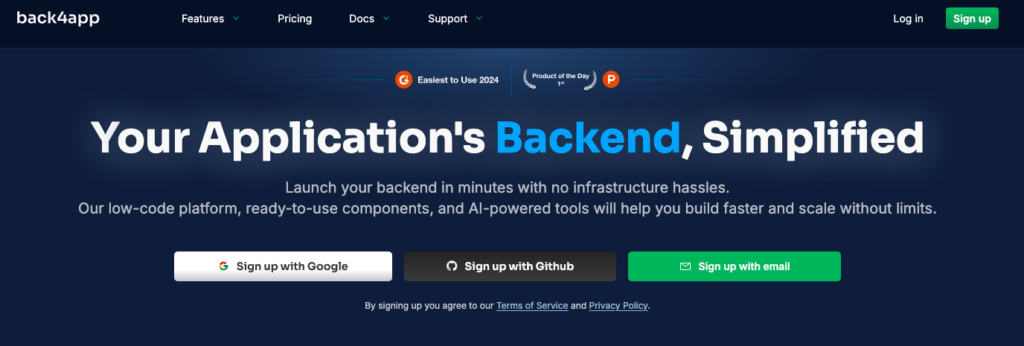
Back4App stands out as a reliable, open-source Firebase alternative. Its core features include a real-time database, auto-generated RESTful and GraphQL APIs, user management, and JavaScript serverless functions.
The platform’s low-code dashboard and natural language interface make backend management fast and intuitive. It offers both a free tier and predictable pricing plans starting at $25/month for serverless hosting.
Many developers choose Back4App to avoid vendor lock-in and for its multi-cloud and on-premise deployment options, ensuring complete control over their infrastructure.
Pricing
- Free Tier – Ideal for testing the platform
- Serverless Hosting – Starts at $25/month
- Dedicated Hosting – Starts at $500/month
Core Features
Back4App’s features include a spreadsheet-like data model (supporting both NoSQL and PostgreSQL), auto-generated APIs, serverless functions, and easy integration with GitHub for continuous deployment.
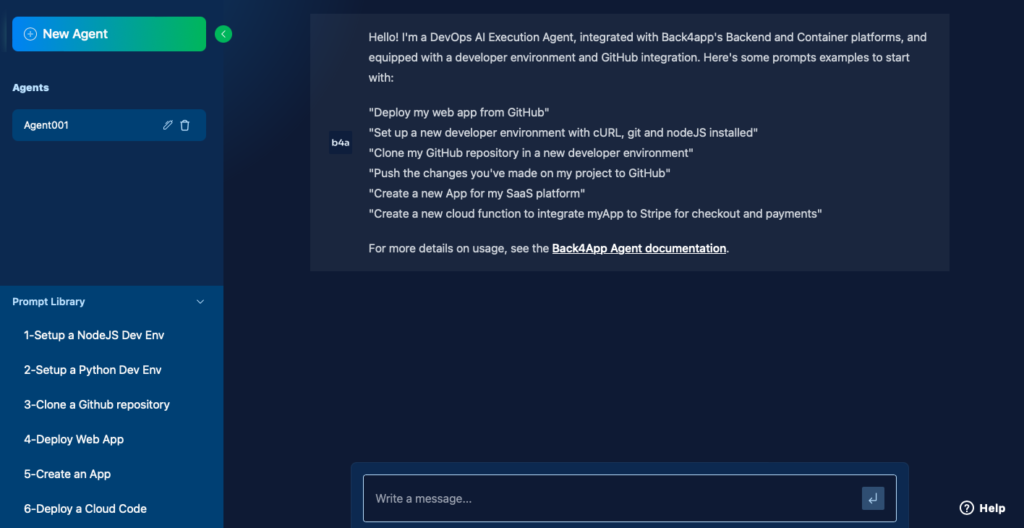
Read the article Back4App vs. Firebase to see a detailed comparison of their capabilities.
Why Use Back4App as a Firebase Alternative?
- No vendor lock-in
- Supports both NoSQL and SQL
- Built on open-source technologies
- Offers multi-cloud and on-premise deployment
- Strong customer support
Parse
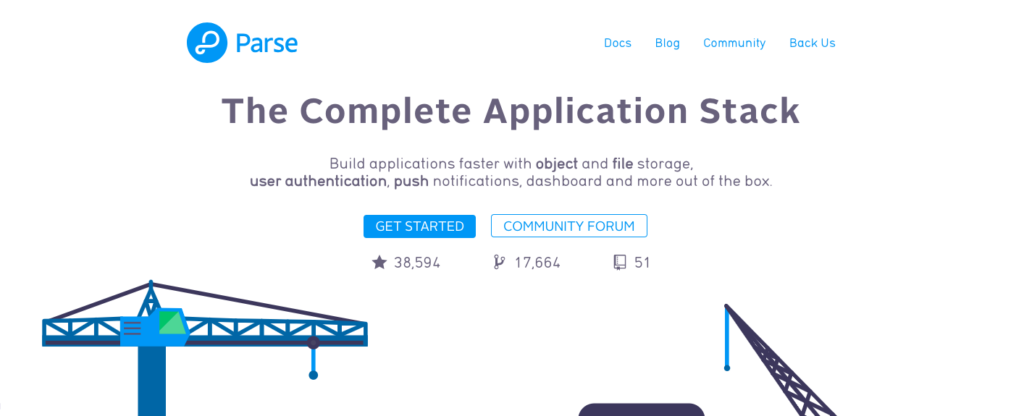
Parse is a free and open-source alternative that allows you to build and customize your backend. Its features include a real-time NoSQL database, user management, file storage, and built-in analytics.
With an active community, Parse lets you self-host your backend on any cloud provider, ensuring complete control and flexibility.
Pricing
Parse is free to download and use under the Apache 2.0 License.
Core Features
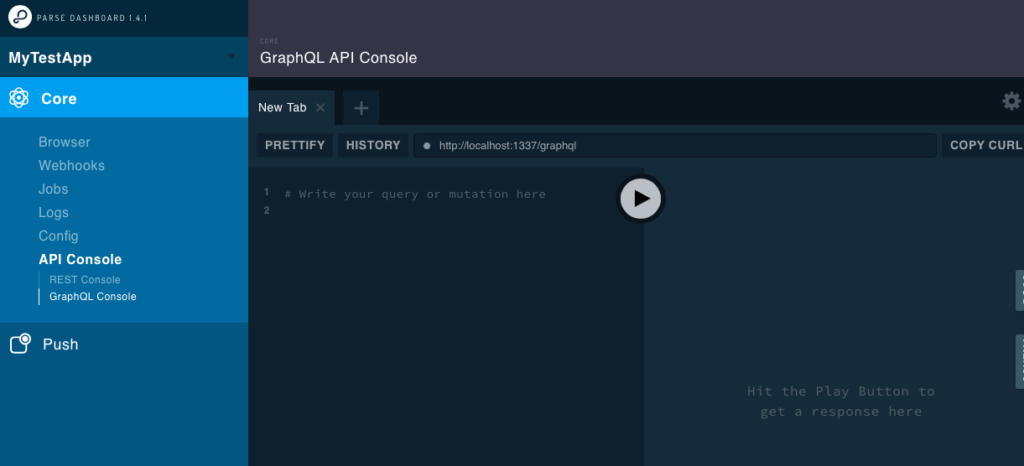
Why Use Parse as a Firebase Alternative?
- Open-source and free
- No vendor lock-in
- Multi-cloud deployment options
- Large developer community
- Highly customizable framework
AWS Amplify
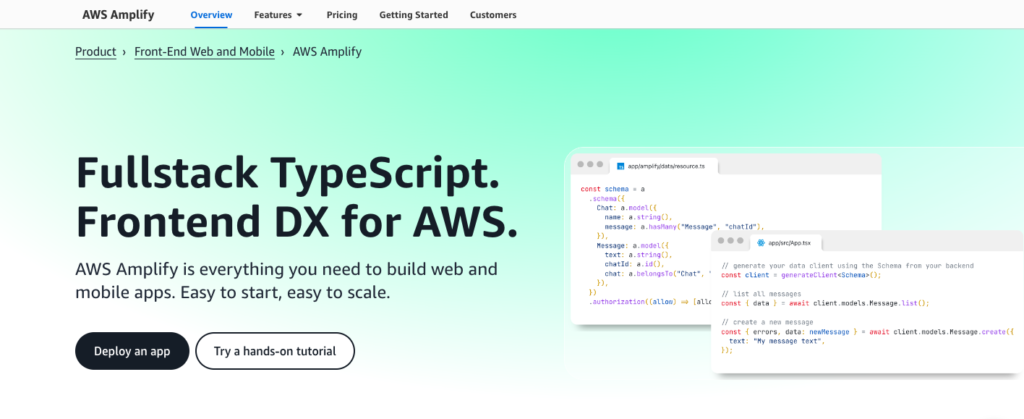
AWS Amplify is Amazon’s BaaS solution that integrates with AWS services like Cognito, DynamoDB, Lambda, S3, and AppSync.
It simplifies building scalable full-stack applications and automates deployment through continuous integration.
Although its pricing is pay-as-you-go, many developers appreciate its seamless integration with the AWS ecosystem and robust deployment options.
Pricing
- Free tier available to start
- Pay-as-you-go model above free threshold
- Build and Deploy – $0.01 per build per minute
- Data Storage – $0.023/GB per month
- Data Transfer – $0.15/GB served
Core Features
AWS Amplify supports multiple source code repositories, automated deployments, authentication, APIs, analytics, and tight integration with other AWS services.
Why Use AWS Amplify as a Firebase Alternative?
- Backed by AWS’s robust ecosystem
- Seamless integration with other AWS services
- Scalable and reliable for full-stack applications
- Ideal for developers already familiar with AWS
Backendless
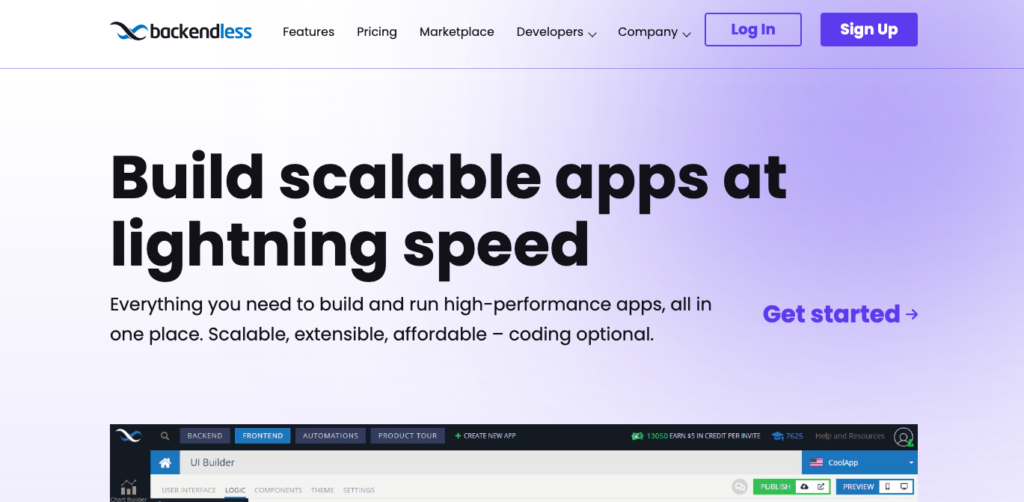
Backendless is a visual application development platform that offers both cloud and on-premise hosting.
It features a unique out-of-the-box UI builder, robust data management tools, and integrations with third-party platforms like Zapier and Bubble.
Its intuitive interface and visual tools make app development accessible even for those with less technical expertise.
Pricing
Backendless offers several pricing categories:
- Backendless Cloud – Free tier available, with paid plans starting at $15/month
- Backendless Pro – Plans range from $10k to $50k/year
- Managed Backendless – Pricing available on request
Core Features
Key features include a robust data model, messaging, cloud code, file storage, and a unique front-end UI builder that allows for rapid application prototyping.
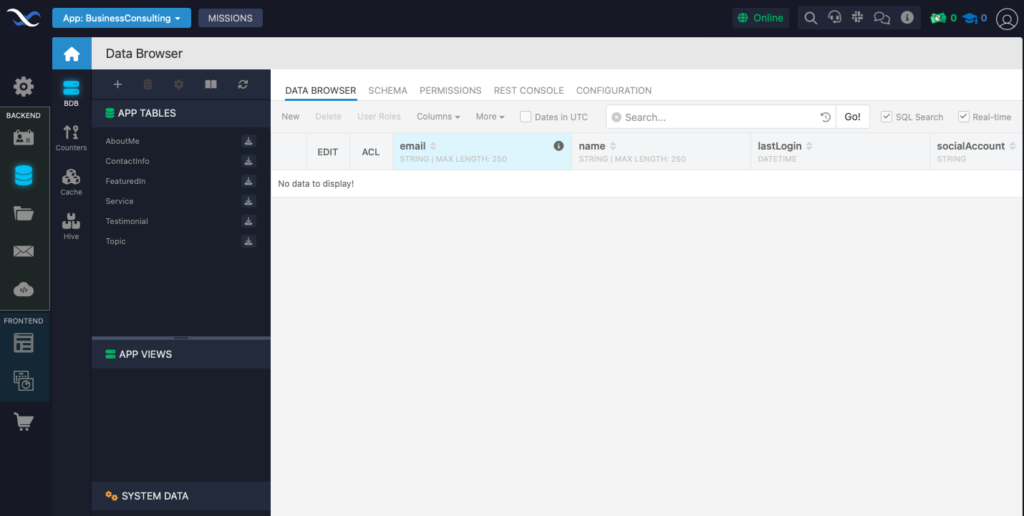
Why Use Backendless as a Firebase Alternative?
- Easy-to-use visual development tools
- Comprehensive integrations with third-party tools
- On-premise deployment option for full control
- Dedicated support plans
Kuzzle
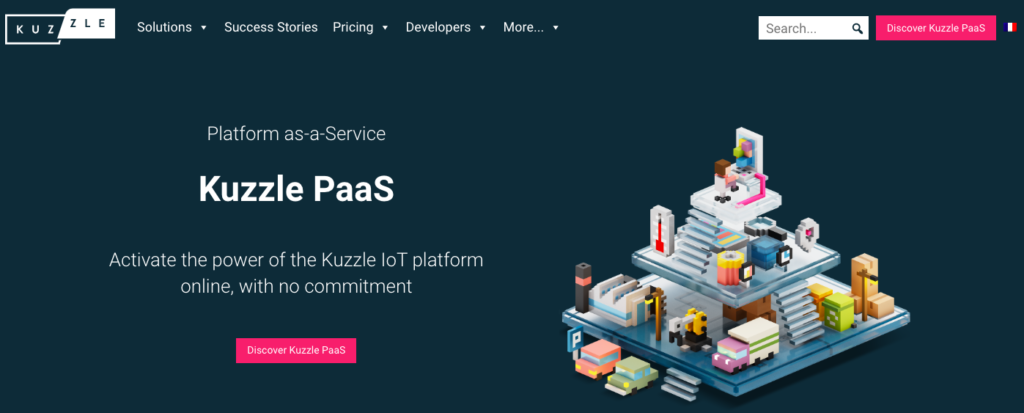
Kuzzle offers three distinct products focused on IoT and web/mobile app development. Its open-source nature and fit-to-purpose IoT features make it a strong alternative for specialized applications.
Whether self-hosted or used via Kuzzle’s cloud, the platform provides multiple SDKs (including Javascript, C#, Dart, and Golang) and has proven reliability with major clients.
Pricing
- Free to download
- Support plans: €500, €1,000, and Premium (under quotation)
- Professional Services, Training, PoC: Under quotation
Features
Kuzzle applies its open-source DNA across a backend platform, fit-to-purpose IoT features, and a Platform as a Service.
Its core capabilities include real-time data storage, authentication, multiprotocol APIs, and advanced IoT management.
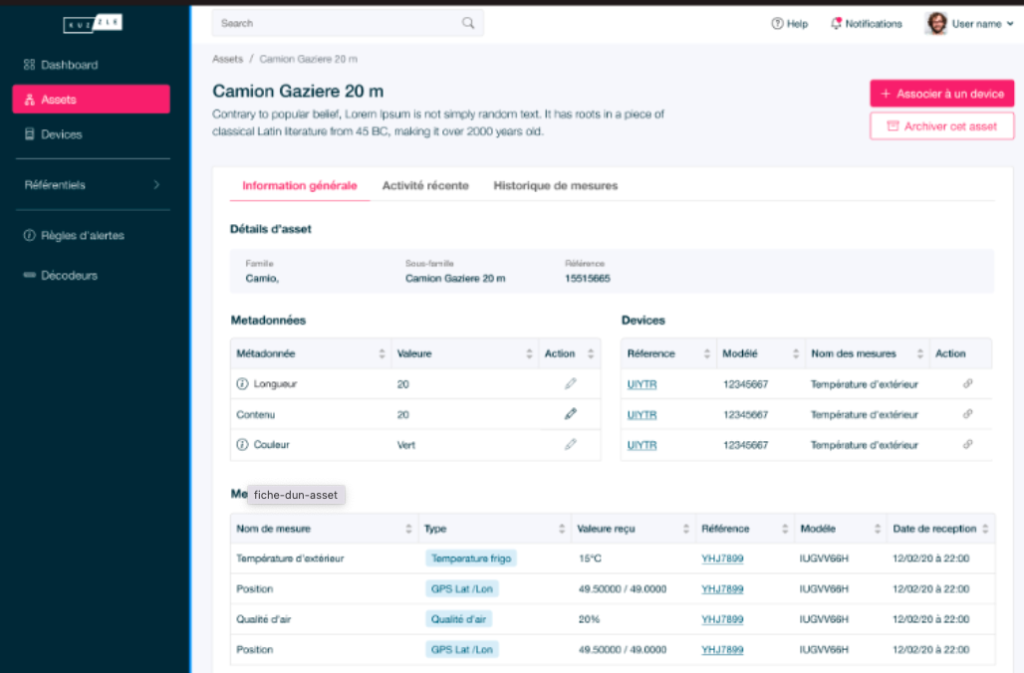
Why Use Kuzzle as a Firebase Alternative?
- Open-source with specialized IoT features
- No vendor lock-in
- Tailor-made professional services and training
Supabase
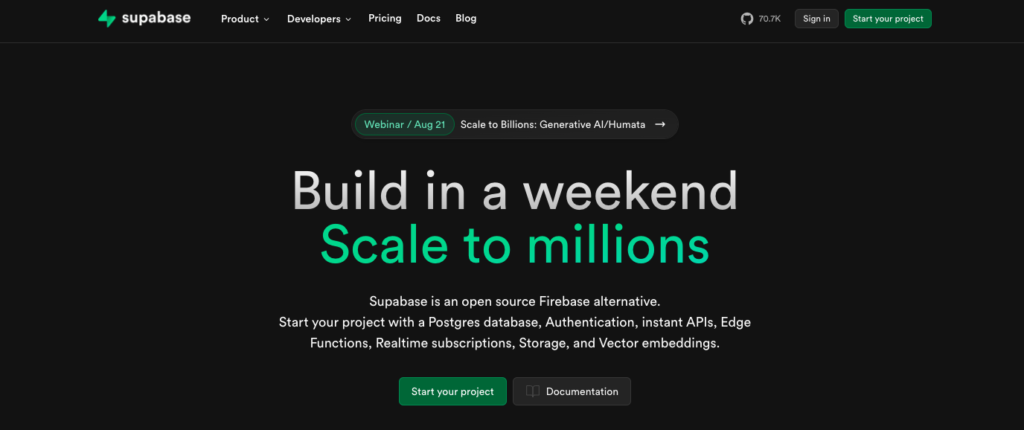
Supabase is a dynamic, open-source alternative known for its fully managed PostgreSQL database, real-time subscriptions, authentication, and now expanded AI/edge function capabilities. Its ease of use means you can launch an app in under 2 minutes.
Whether self-hosted or used via the Supabase cloud, it offers a robust developer experience with extensive documentation and community support.
Pricing
- Free Tier – Great for testing and prototyping
- PRO Plan – $25/month
- Team Plan – $599/month
- Enterprise Plan – Under quotation
Features
Supabase offers a managed Postgres database with an Excel-like interface, authentication, storage, edge functions, and even a vector database for AI applications.
Why Use Supabase as a Firebase Alternative?
- Open-source and developer-friendly
- Robust support for SQL (PostgreSQL) and real-time APIs
- Multiple deployment options – self-host or cloud
- No vendor lock-in
appwrite
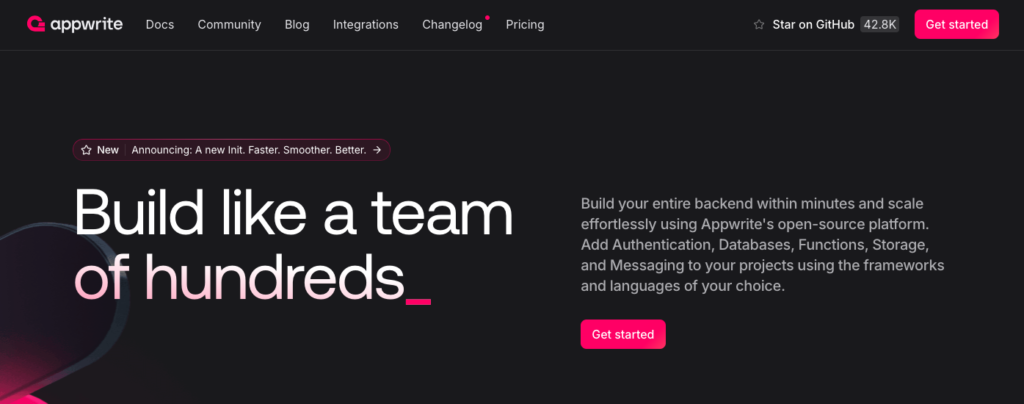
Appwrite is an open-source backend server that offers comprehensive support for web, mobile, and desktop applications. It features authentication, databases, file storage, serverless functions, and real-time messaging.
Native support for popular frameworks like Flutter, Next.js, React, and Vue makes it an excellent choice for developers seeking a streamlined backend experience.
Pricing
- Starter Plan – Completely free
- Pro Plan – $15 per member per month
- Scale Plan – $599 per organization per month
- Enterprise Plan – Under quotation
Features
Key features of appwrite include comprehensive authentication options, a scalable database with in-memory caching, secure file storage, and integrated messaging services.
Why Use appwrite as a Firebase Alternative?
- Open-source and developer-centric
- Easy setup and intuitive interface
- Comprehensive feature set for backend development
Nhost
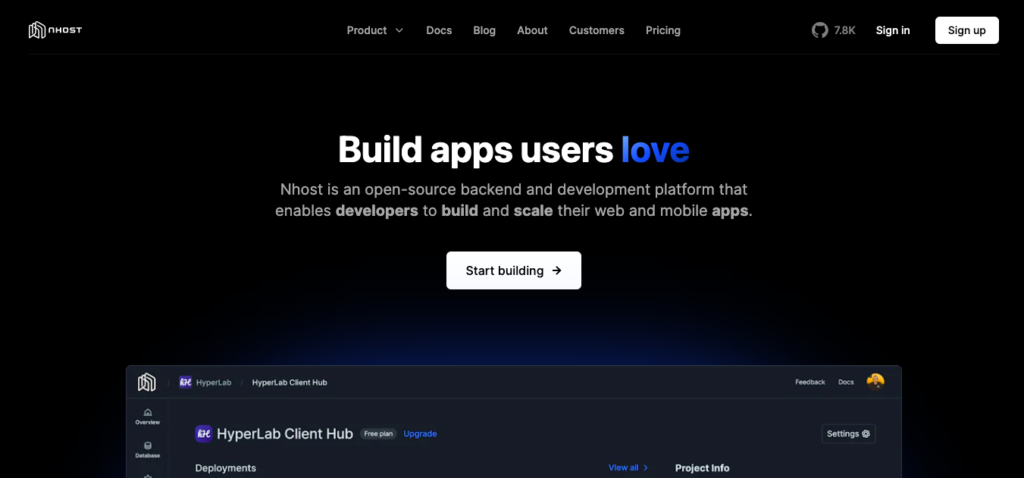
Nhost is a developer-friendly, open-source platform that features a Postgres database with native GraphQL APIs, real-time capabilities, authentication, and serverless functions.
It is designed for a quick development turnaround and offers a low learning curve along with excellent regional support and a rich CLI for local development.
Pricing
- Starter Plan – Completely free
- Pro Plan – $25 per project per month
- Team Plan – $599 per project per month
- Enterprise Plan – Under quotation
Features
Nhost provides a fully managed Postgres database, out-of-the-box GraphQL APIs, serverless functions, file storage with a global CDN, and container services supporting multiple programming languages.
Why Use Nhost as a Firebase Alternative?
- Open-source and easy to set up
- Great developer experience with native GraphQL support
- Low learning curve and rapid deployment
- No vendor lock-in
Kinsta
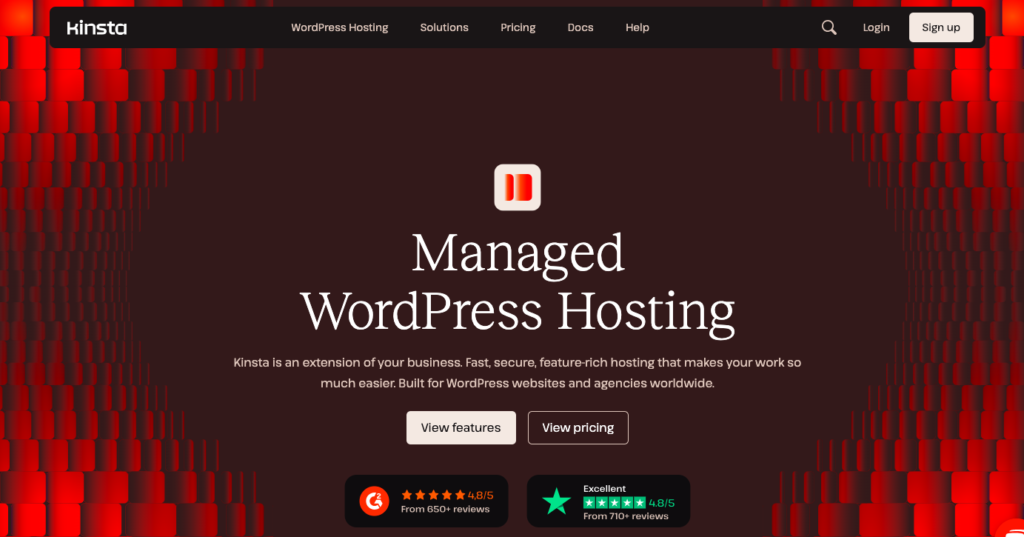
Kinsta offers traditional cloud hosting primarily focused on WordPress and web applications. Its platform features automated backups, staging environments, built-in security, and excellent scalability.
Companies like Trango Tech and industry giants such as Tripadvisor and Unicef rely on Kinsta for its reliable hosting and performance optimization.
Pricing
Kinsta’s pricing varies by service:
- Static Sites – Free
- WordPress Hosting – Starts at $30/month
- Web Applications – Starts at $7/month
- Managed Databases – Starts at $18/month
Features
Kinsta leverages Google Cloud to deliver fast, secure hosting with edge caching, continuous MySQL optimization, and comprehensive monitoring.

Why Use Kinsta as a Firebase Alternative?
- Easy-to-use and traditional hosting approach
- Supports a variety of web applications and databases
- 37 data centers for global deployment
- SOC2 compliant with strong security standards
Hasura
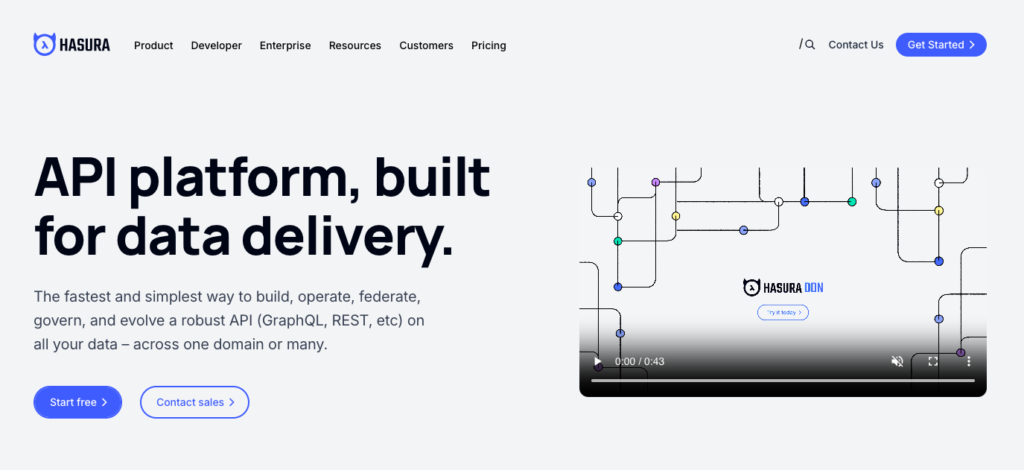
Hasura simplifies API development by unifying multiple data sources into a high-performance GraphQL API. It supports several databases including Postgres, MySQL, SQL Server, and more.
It also features advanced CI/CD tooling and monitoring tools, ensuring rapid iteration and scalability while meeting modern security standards.
Pricing
- DDN Free – Ideal for individual developers
- DDN Base – Perfect for single teams
- DDN Advanced – For federated supergraphs across multiple teams
Features
Hasura enables filtering, pagination, sorting, aggregations for GraphQL, and API versioning. It integrates seamlessly with multiple databases and offers robust monitoring to track performance.
Why Use Hasura as a Firebase Alternative?
- Open-source and versatile
- Supports both NoSQL and SQL databases
- Works seamlessly with external data sources
- Offers enterprise-grade features
- Low latency and high scalability
Other Firebase Alternatives
Other notable alternatives include Ably for real-time messaging, PubNub for notification systems, 8Base for AI-based development, and Heroku for full-stack deployments. These options further illustrate the diverse ecosystem available beyond Firebase.
User Reviews & Ratings
To help you make an informed decision, here’s a quick look at what real users are saying about these Firebase alternatives:
- Back4App: Rated 4.8/5 on G2 for ease of use and robust customer support.
- Parse: Celebrated for its flexibility and active community support. Learn more on G2.
- AWS Amplify: Earns a rating of 4.2/5 on G2, appreciated for its seamless AWS integration.
- Backendless: Recognized for its visual development tools and user-friendly interface. See reviews on G2.
- Kuzzle: Praised for its specialized IoT capabilities and open-source approach. Check feedback on G2.
- Supabase: Highly rated for fast deployment and developer-friendly documentation. Explore reviews on Product Hunt.
- Appwrite: Noted for its comprehensive feature set and intuitive setup. Read reviews on Product Hunt.
- Nhost: Known for its native GraphQL support and ease of use. See feedback on Product Hunt.
- Kinsta: Valued for its fast, secure hosting and excellent support. Check out reviews on G2.
- Hasura: Praised for high-performance GraphQL APIs and versatility. View user feedback on G2.
These ratings are drawn from trusted sources like G2 and Product Hunt, offering a snapshot of each platform’s performance and user satisfaction. Be sure to check out the detailed reviews on each platform for the most current feedback.
Firebase Alternatives Comparison
| Name | Open-Source | Support | Free Tier | Pricing | Deployment Options |
| Firebase | No | Yes | Yes | Pay-as-you-go | GCP Only |
| Back4App | Yes | Yes | Yes | Starts at $25/mo | Multi-cloud / On-Premises |
| Parse | Yes | No | Yes | Free | On-Premises |
| AWS Amplify | No | No | Yes | Pay-as-you-go | AWS |
| Backendless | No | Yes | Yes | Starts at $15/mo | Cloud / On-Premises |
| Kuzzle | Yes | Yes | Yes | Starts at $500/mo | Cloud / On-Premises |
| Supabase | Yes | Yes | Yes | Starts at $25/mo | Cloud / On-Premises |
| Appwrite | Yes | Yes | Yes | Starts at $15/mo | Cloud / On-Premises |
| Nhost | Yes | Yes | Yes | Starts at $25/mo | Cloud |
| Kinsta | No | Yes | Yes | Starts at $7/mo | Cloud |
| Hasura | Yes | Yes | Yes | Starts at $1.50/active hour | Cloud / On-Premises |
Conclusion
Firebase remains a robust platform for app development, but its closed-source nature, vendor lock-in, limited SQL options, and unpredictable pricing have led many developers to explore alternatives.
In this article, we’ve highlighted 10 excellent Firebase alternatives that offer open-source flexibility, modern features like native GraphQL and real-time APIs, and diverse deployment options—from cloud to on-premise.
Whether you’re building real-time apps, IoT projects, or robust web backends, these platforms – including Back4App, Parse, AWS Amplify, Backendless, Kuzzle, Supabase, Appwrite, Nhost, Kinsta, and Hasura – provide viable, cost-effective, and scalable solutions to meet your development needs.
Explore these alternatives further to determine which one best aligns with your project requirements and long-term goals.



